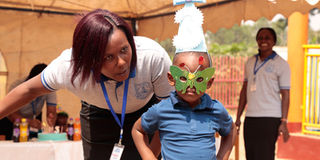Why pre-schools are increasingly becoming vital

Children in pre-school are taught how to play and colour, among other activities. FILE PHOTO
What you need to know:
- About pre-school. Preschool is all about learning through open-ended play and structured play activities that allow children to develop at their own pace. Whether your child is finger painting, building a block castle, or singing with other children, preschool helps your child increase their experiences, abilities and knowledge.
Nursery school education as we know it today in Uganda is a recent development in the long story of education. It first developed in Europe with the arrival of the Industrial Revolution in the 18th Century.
The period provided plenty of employment opportunities and often both the husband and wife had to go to work, resulting in the challenge of where to leave the children when they were away from home.
Individuals who were mostly elderly women offered to take care of the children as their parents went to work in the factories. With time, groups of parents found it necessary to question and regularise the capacity of the women under whose care they put their children. They eventually came up with guidelines and modalities to be followed by those in the business of taking custody of children, according to Wikipedia.
Eventually many children care centres took up the resemblance of schools due to the educational activities that the children were introduced to, such as singing, drawing, and storytelling, among many others.
The Ugandan story
Here in Uganda, nursery schools, or daycare centres, are also a fairly new phenomenon because the factors that make them unavoidable took long to manifest.
For so long, since the arrival of the school education system at the beginning of the last century, the government has not taken on the responsibility of training nursery school teachers and caregivers or providing grants to the mushrooming nursery schools.
They are a private sector business which, however, the government is increasingly paying attention to, given their direct connection to formal primary school education.
Gerald Nsambu, the Masaka District Inspector of Schools, says, “The government does not offer financial support to nursery schools but it has an interest in the way they are managed and run. They are left to the private sector but as a government schools inspector I have to visit them to see if they are following the set guidelines as provided by the Education ministry.”
Nsambu goes on to explain that in Africa nursery schools are mainly the result of increasing urbanisation and acquisition of western education which, like in the European Industrial Revolution period long ago, has provided equal employment opportunities for both men and women.
“Parents increasingly find it risky to leave their children under the care of househelps. Yet most workplaces have no facilities for keeping children. So a child daycare centre or nursery school becomes the best option for them.”
Plenty of room to play
“Apart from that, many families live in flats and other forms of housing that do not provide sufficient space for the children to vigorously play and run about. They cannot be allowed to go out of the house to play on their own or in the streets due to the thick traffic and now almost rampant kidnapping of children,” he says.
This, therefore, explains the mushrooming child daycare centres or kindergartens as they are referred to.
“At the nursery school or kindergarten, there is sufficient space for the children to run about and to engage in vigorous exercises needed for their healthy growth. We expect the nursery to have a lot of toys and plenty of equipment for children’s games,” Nsambu asserts.
He further explained that nursery schools are not expected to teach Primary One work – such as reading and writing as introducing that kind of work to three or four-year-olds discourages them from learning.
In the learning format provided by the Education Ministry, there is work for children aged three, (baby class) four years, (middle class) and five years (top class).
Nsambu says the children are expected to do a lot of playing, some singing, dancing, drawing and molding.
The caretakers should be in a position to handle some of the children’s health problems such as flu or administering medicines as prescribed by health workers.
Good observation
Ideally this is the best time for the care providers to observe the children to discover if they have any sight or hearing impairments so that they can be attended to at an early stage in their development.
Should the nursery schools follow the same school calendar as the ordinary schools, closing them during some months of the year for holidays? Nsambu disagrees, “They were not founded to provide education if you remember their genesis. The parents have the constant problem of the children’s custody when they go to work. So closing the nursery school for holidays would mean presenting a safety problem for their children.”




